Ann Voskamp's Blog, page 19
May 10, 2024
Liturgy for a Mother To Read To Her Child On Mother’s Day
Dear Child of my heart…
There is a world where Mother’s Day is the day where mothers take a moment to pause to awe in the miracle that they ever got to be one at all.
A day where this mother realizes I might never have held you… might never have belonged to you …might never have looked into your eyes and known that I was going to love you straight right through everything, till my very last breath.
I might never have gotten to be your home — and you may never have known how my heart’s always gone with you, wherever you go.




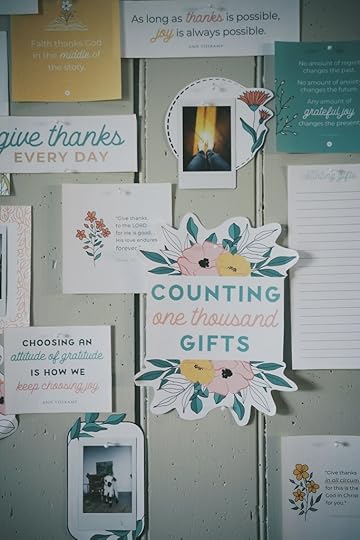

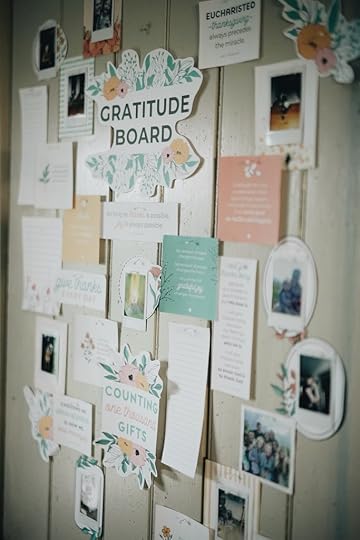

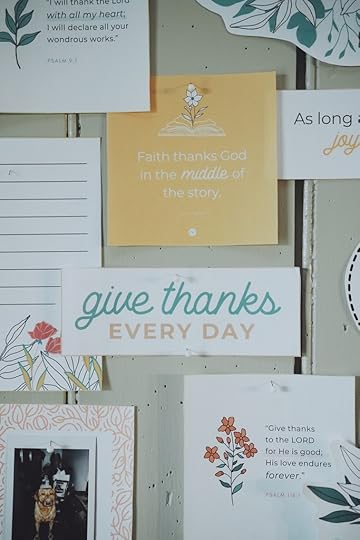

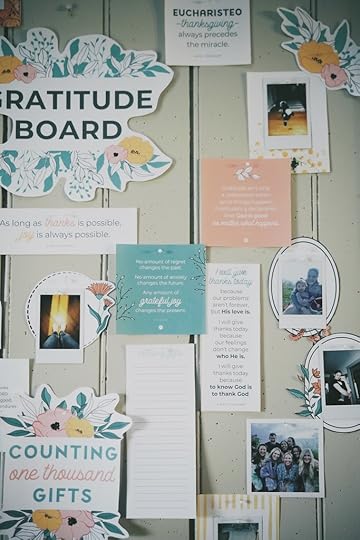

Love isn’t about meeting fantasy expectations but meeting each other with grace.
Sure, some may swoon over swaddled tiny humans, or light up in the face of big-eyed little people, but I don’t want to go back to a younger or different version of you. Back to that giggling babe you once were who made my heart right erupt, or back to that lispy toddler who crawled up in my lap to take my face in chubby hands and tell me all the breathless things…
Because when I look into your eyes, I see all the ages and faces you’ve ever been and you are whole words to me and I’ve been the enthralled, front row witness to every single version of you and I’ll never stop wanting to see more of your brave becoming.
Because the way I see you always in my world:
You are a star who is not small
to anyone who orbits your love blazing through it all.
You are a constellation in my sky,
whose love connected all the dots so I could see how everything is drawing the shape of grace across the dark.
You are one rare story that has to be told by the God who so believes in you, He’ll move into you to keep writing hope on all your impossible walls, who keeps raising the sun over you, because He’s intent on raising all His dreams for you.
Love isn’t about becoming the figment of someone’s imagination— love is about becoming like Jesus to each other.
And sure, frankly, maybe there were more than a few days when you wished I was somehow different — and maybe, true, there were a day or two when I wished you were somehow different too?
But you and I, we’ve been down more than a few winding roads together, and we’ve arrived… at that lookout where we can finally see the view we’ve both long been looking for:
Love isn’t about meeting fantasy expectations but meeting each other with grace.
Love isn’t about becoming the figment of someone’s imagination— love is about becoming like Jesus to each other.
Love lets go of expectations so we can hold on to each other.
The work of every parent is to now give the best they know how — and the work of every child is to forgive their parents the best they can now.
And holding you has held together parts of me, and growing you up has been a needed growing of me, and getting to be a witness to your life has been the honor of my life that will never stop changing me all of my life. And there are so many things about me that I wish I could go back to change for you.
The times I failed to show up in the ways you’d needed, failed to show up so you felt seen, or showed up but in ways that let you down — I ache to go back and show you the comfort of Christ and the delight of God in you.
And then there were the times I failed to do the most important work of being human and find ways to emotionally regulate, the times I wasn’t your calm and I was part of generational trauma I never wanted to exacerbate, the times I didn’t love you with all my attention and didn’t treat you as I would Christ – I am here saying more than I’m sorry – I am saying I’m committed to doing better from now on into forever.
It’s the tender heartbeat of honest motherhood:
Please forgive me of the sins in my own life that I didn’t slay, that you now have to daily wrestle in your own life to the death…
Forgive me for ever speaking to you in ways that didn’t express your infinite worth in the eyes of God.
And please forgive your mother for not being more like your Abba Father.
The forever work of a parent isn’t to take credit for your children, or take condemnation for your children, but to prayerfully keep taking your children to Christ no matter what
I got so much wrong, but maybe: Motherhood isn’t so much about getting it all right — it’s about you and I getting to be on this planet together at the same time, it’s about you and I getting to taste His amazing grace together, it’s about you and I getting to share life together in a way that’s singular and surreal and a bit sublime and and us doing this sacred work together:
The work of every parent is to now give the best they know how —
and the work of every child is to forgive their parents the best they can now.
Every moment compounds and what if all our moments filled with grace?
And the forever work of a parent isn’t to take credit for your children, or take condemnation for your children, but to prayerfully keep taking your children to Christ no matter what — and I promise to always be your greatest prayer warrior and love you every day on my knees.
Every moment compounds and what if we all filled more of the moments with the power of prayer?
It’s the prayers for our people that we weave into the matching of socks, the stirring of soup, the washing of dishes, they are what survive fire.
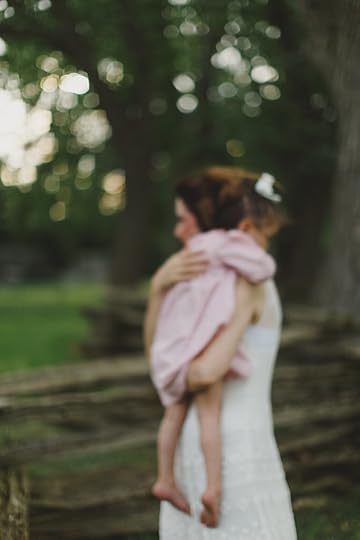



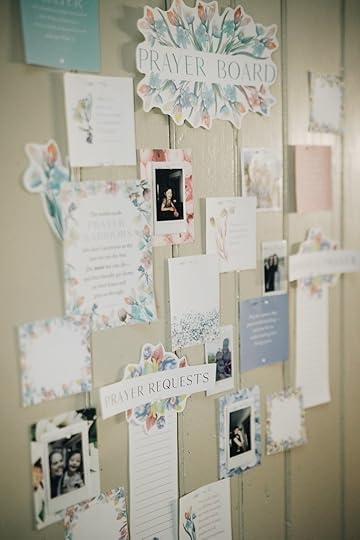



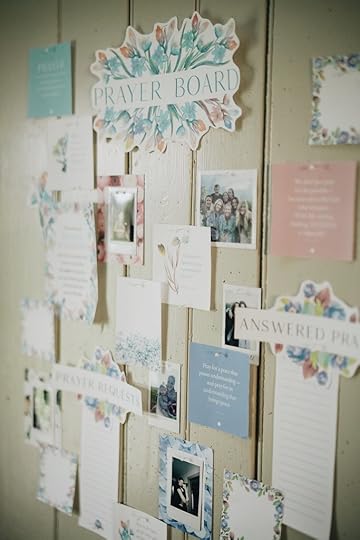


With you – nothing was really a sacrifice, but only more ways to love you.
There is a world where Mother’s Day is the day where mothers pause to awe in the miracle that they ever got to be one at all – and simply say:
With you – nothing was really a sacrifice, but only more ways to love you.
With you – there’s always grace and gratitude and prayers because this is how we can speak the language of love wherever we are.
With you – everything’s been nothing short of a miraculous gift.
With you, with you, with you…. always with you.
My heart for yours,
my walk with yours,
my life bound to yours,
till my last breath, then always and forever.
And the gift of getting to be your mom is all the thanks I’ll ever need.
Free Gifts for You or Any Woman Who Longs for More Joy & Prayer in Her Life(Is there really a better (free!) gift?)
 Every brave heart, every mom, every woman in every season:
Every brave heart, every mom, every woman in every season: Who doesn’t want to get the free gift right now of more Joy, more prayer?
Gather all your women and make your own prayer and gratitude boards! The perfect girl’s night life-changing activity for friends, a youth group, a small group, college friends, room mates, a family!
Or send the link to your men, your people, and let the them print out this whole free package and gift you the free gift of a your own Free Prayer Board or Gratitude Board — & give you the gift of more gratitude to God, more joy in God, more prayer with God!
May 8, 2024
It’s Not Too Late to Write a Different Ending to Your Story, Your Family
I first met Lisa-Jo Baker 13 years ago in an airport terminal in Dallas en route to Guatemala, traveling with Compassion International, and I know the exact number of years, because it’s the same age as the daughter she would tell me she was pregnant with right after I hugged her hello in person for the first time! Since then I’ve slept on her sofa and she’s slept in our tiny house and we’ve done daily life together, cried together, prayed together, done laundry together, and suffered through tooth extractions and implants together, and I don’t ever want to imagine my life without her daily friendship. We’re praying to be friends long past the days when we’ve lost most of our teeth to dentures and will be rocking together on the front porch swapping stories of how the goodness and faithfulness of God has re-written even the most painful parts of our family stories. She’s one of the very best writers I know and it’s a wild joy to welcome her to the farm front porch today:
Guest Post by Lisa-Jo Baker
I remember the exact moment when I knew I’d become my father.
The memory isn’t a visual one. It’s a visceral one. I don’t remember the moment like you remember a story. I remember the moment like you feel an emotion. Like seeing an old photo that falls out of a book and you can’t quite remember what happened the day the photo was taken.
You don’t remember what time it was or what season or what any of you were eating, drinking, or talking about. You recognize your dining room table and your middle son and the blurry faces of your two other children, but you can’t describe what came before or what came after the photograph.
All there is is the snapshot. Suspended in time. It stands alone.
But the emotion roars in my memory.
It was an out-of-body experience.







The only other times I have felt that kind of adrenaline-pumping, sweaty, jaw-clenching aching of bunched muscles laying siege to the body that shakes with the tremors of its own internal earthquake pushing up, up, up, from the lower intestines through the straining tendons in the neck, forearms, and fists and out the vocal cords, vibrating with the falsetto of rage, was when it was directed at me. When it was my father’s body, his tendons, his voice.
But this wasn’t my father now, here. It was my own body clenched with the oncoming tsunami of rage.
I felt the explosion like a kind of beautiful blackout. Like suddenly all the patience and exhausted reasonableness that I’d been holding on to, that had been slipping like a fraying wire through my hands, finally snapped, and as the metal sliced through my palms and I unclenched my fingers and gave up the battle to hold on to my reason and my polite voice, all I felt was relief.
The tension in my shoulders, the fear in my belly, the despair in my heart after hours of hostage-negotiation-level parenting were erased by a single blissful feeling. A pure, unadulterated orgy of anger swept all other parenting feelings and failings aside like they were nothing, like they were tiny twigs drowned beneath Niagara Falls.
And I bore down in my anger, like the day I delivered my boy into the world, and placed my forehead level with my middle son’s head and let my eyes burn into his ten-year-old reflection of me.
And I opened my mouth and let the freight train come screaming out.
“And as I hovered outside myself, watching the lava pour out of my mouth, one single thought shot ice-cold through my inferno: I am my father.“
I don’t remember what I said.
I only know that I screamed so loud and so long that for days afterward my voice was hoarse and my throat ached like an overused muscle. I punctuated my screams, my sarcasm, my venom with my hands slamming down on the table. The beautiful, broad beams of a pine table that I’d stained rich, dark chocolate shook under my hands. Scream, slap the table, roar, slam the planks, gasp down air, scream again. I pounded my point home.
Like I said, it was an out-of-body experience.
I watched him watching me. His mother. This wasn’t our first rodeo. He knew what was coming.
I watched him brace. I watched him holding in all his fear, his confusion, his despair in his tight-pinched mouth and burning cheeks, willing himself not to let his own wail out. I watched myself terrorize my son. I watched his spirit cower behind his eyes, behind the tears he was too embarrassed to let fall, watching me and waiting for it to be over. Trying to become as small and still as possible so as not to step on another landmine.
I watched and I recognized the signs of my own terrified childhood. And still I kept screaming. I chose to keep screaming.
And as I hovered outside myself, watching the lava pour out of my mouth, one single thought shot ice-cold through my inferno: I am my father.
I have often thought my father would have made an excellent Napoleon or Admiral Nelson. He is a man wired for conflict, for battle, who isn’t suited to the domestic niceties of small talk or political correctness.
I could have seen him driving an ox wagon and staking his claim on the fertile farmland and freedom that the Voortrekkers, literally translated “front pullers” in Afrikaans—South Africa’s version of pioneers—came in search of. I could have seen him commanding a ship, mapping out new trade routes, leading mighty men into battle.
He is a man wired for action, as hard on himself as those around him.
“Their frozen faces watched our comings and goings, the past silently bearing witness to the battles still raging in the present.“
And my imagination is tamer than the truth. My father’s side of the family tree has wild branches that grew right out of an H. Rider Haggard novel.
He has an ancestor who was an admiral in the British Royal Navy, served during the Napoleonic Wars, and was later a member of Parliament and a leading figure in British horse racing.
He was the second son of the 1st Earl of Stradbroke. He joined the navy at thirteen. His older brother joined the army at sixteen and earned the Military General Service Medal, reached the rank of captain, and was injured during Wellington’s campaign and so missed out on Napoleon’s defeat at the Battle of Waterloo by just two days.
Battles are in my bloodlines. And my veins.
This family tree grows wild, knobby, and knotty, between the first and second floors of my father’s house in South Africa. A forest of births and marriages and deaths, names and layers of history that my dad researched and tended on his wall, marking the sepia photos with tiny Letraset numbers to match the faces to the names.
Like living bark pressed between the glass photo panes. Entering the house was to walk under their shadow. Their frozen faces watched our comings and goings, the past silently bearing witness to the battles still raging in the present.






When I was a child, I thought like a child.
I thought those people on the wall had very little to do with the nine hours we used to drive every summer holiday from our home in Pretoria, capital city of South Africa, to the middle-of-nowhere, one-traffic-light town of Middelburg, a small hamlet stranded in the Karoo, the vast interior of the country—a region the size of New Mexico with scrubby desert as far as the eye can see.
The Khoikhoi people were the first to walk its dirt and call it Karoo, meaning “hard, dry; a land without water.” The Karoo is our outback, and Middelburg literally translated means “Middle Town” because of its location—a wilderness pit stop halfway between the twin metropolises of Pretoria and Cape Town.
“But we are none of us lone rangers; every dandelion seed, no matter how far it was huffed and puffed from its origin story, carries the chloroplast DNA of its ancestors.“
It also marked the location on the map of my childhood of every memory that grew out of my father’s family tree. Because thirty minutes outside of Middelburg was the sheep farm where my father grew up, named after his British ancestor, the Earl of Stradbroke, and his warring sons.
To my child’s eye, the name was as nondescript as any other street sign, the green reflective background and the white letters simply spelling out the turnoff for our farm. It was a name I accepted at face value, never making the connection to the photos on our wall back home.
Stradbroke was simply the odd name of a farm on a sign on the long strip of highway outside a town in the middle of nowhere. It was the marker that told us we’d reached the end of a journey that felt endless to a child.
At the sign, my brothers and I would sit up, roll down the windows, and breathe in the dry dirt road that turned off the highway and ran like a vein into the South African escarpment, offering adrenaline, adventure, and playing at farming.
I didn’t realize it was a living thing, that name. I still thought like a child.
How could I know at ten that the scream echoing around my dining room table in Hanover, Maryland, at forty-four would have its origin on that farm, grown from that family thorn tree?
But we are none of us lone rangers; every dandelion seed, no matter how far it was huffed and puffed from its origin story, carries the chloroplast DNA of its ancestors. Scientists can trace how plant populations move by studying their seed dispersal.
What grew in Maryland blew across the Atlantic from the Karoo and before that must have swirled and seethed across the seas on board an admiral’s vessel that, once upon a time, set sail from England and docked at the Cape of Good Hope.
My father is seventy-seven now. I am fifty.
I don’t know what age you are.
I don’t know if you left when you should have stayed, hated when you should have forgiven, broke trust when you should have been faithful.
To refuse to repeat the sins of our parents—we must first go back.
But I do know what it feels like to believe you’re too late. That there’s been too much damage. That the only way forward is repeating where you came from.
That you’re too angry, too sad, too far gone for a rewrite. I know that very, very well. I hear it in my dad’s voice and my worst three-a.m. fears. I read it in the history of my motherland, South Africa, and the headlines of my adopted homeland, America.
Regret is both individual and universal, personal and communal.
And still.
And still, that is not the whole story.
I want to tell you the whole story. Or at least, a more whole story.
I want to unpick the plot points that were impossible to make sense of while we were living them and explain to you why you’re not too late.
That some stories don’t have to be repeated.
That new stories are waiting to be written in your bloodline.
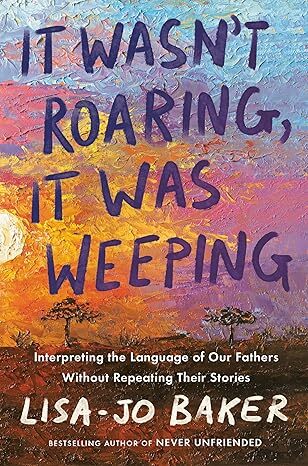
You have got to read this “unputdownable” book, especially if you feel like it’s too late to change, too late to change your story.
The writing is truly phenomenal — an absolute page-turner. And the story Lisa-Jo tells, it can profoundly turn around the story of your family.
Lisa-Jo Baker is a lapsed lawyer, co-host of the Out of the Ordinary podcast, and a bestselling author of the just released memoir: It Wasn’t Roaring, It Was Weeping.
When she found herself spiraling into a terrifying version of her father, screaming herself hoarse at her son, Lisa-Jo realized that to go forward—to refuse to repeat the sins of our fathers—we must first go back.
This is a GORGEOUS, unflinching look at a family that got it wrong and a real life example for all who feel worried they’re too off-course to make the necessary corrections.
Lisa-Jo’s story shows that it’s never too late to be free.
Born white in the heart of Zululand during the height of apartheid, Lisa-Jo longed to write a new future for her children—a longing that set her on a journey to understand where she fit into a story of violence and faith, history and race.
Before marriage and motherhood, she came to the United States to study to become a human rights advocate. When she naively walked right into America’s own turbulent racial landscape, she experienced the kind of painful awakening that is both individual and universal, personal and social.
Years would go by before she traced this American trauma back to her own South African past.
Lisa-Jo was a teenager when her mother died of cancer, leaving her with her father. Though they shared a language of faith and justice, she often feared him, unaware that his fierce temper had deep roots in a family’s and a nation’s pain.
Decades later, old wounds reopened when she found herself repeating the violent patterns of her childhood in her own parenting.
Only then did she begin the journey back to the beginning to find a way to break old cycles and write a new story for her family and the next generation.
May 6, 2024
I Shouldn’t Feel This Way About My Body
I really love this woman and her work has been so formational in my own walk with the Lord toward wholeness in Him. Beacuse it’s true: Our emotions can feel so hard and so complicated, and yet God designed us to feel deeply! In her new book, I Shouldn’t Feel This Way, Dr. Alison Cook is helping us to untangle the emotions that we feel about ourselves, about others, and even about God. Today’s post zooms in on the painful feelings so many of us experience about our own bodies. I am thrilled to welcome Dr. Alison to the farm’s front porch today. . .
Guest Post by Dr. Alison Cook
So many of us struggle with conflicting feelings about our bodies.
We know we “should” care for our bodies, but so often those guilt messages become the only messages we tell ourselves.
I should eat healthier.
I should exercise.
I should do this.
I shouldn’t do that.
I shouldn’t feel this way about my body.
Talk about dissonance! We want to feel healthy in our bodies, but so often we ignore their cries for help or the warning signals they send. We analyze, criticize, or guilt-message ourselves about our bodies. We might even abuse or neglect them, only to give them a quick fix when their poor, tired selves beg for our attention.
This has certainly been my experience, and it’s the experience of many of my clients. Yet our bodies need us, and we need our bodies.





 At the Crossroads with Our Bodies
At the Crossroads with Our BodiesYour body is so much more than a frame for your outward appearance. It weaves together all the different pieces of your soul through a complex system of neurons and cells and the nervous system, with your brain at its epicenter.
It encases your soul with skin and hair. It has eyes to see, ears to hear, and a mouth to express and interact with the world around you. Your body serves as your visible presence in the world—it keeps you from being invisible.
Your body is also intimately involved in all your decisions. Your nervous system not only orchestrates your physical movements but also helps you process feelings of fear, joy, pain, and stress. It detects threats and mobilizes you to take action. It carries the burdens of past trauma, often silently, on your behalf.
“Instead of fully inhabiting our bodies—caring for them and allowing them to care for us—we attempt to sideline them. “
Perhaps we haven’t been fully taught ways to honor this body, so that we are left feeling so vulnerable: vulnerable to painful emotions, to sickness, and to scrutiny. Vulnerable to a world that can feel dangerous. So often we secretly despise our bodies for not shielding us from pain, shame, and judgment from others. Instead of fully inhabiting our bodies—caring for them and allowing them to care for us—we attempt to sideline them.
We can tend to disregard the cues that our bodies are desperately trying to send us. Why can’t I just get it together? we say to ourselves, instead of noticing tension or a sudden onset of exhaustion as an opportunity to name something that feels hard—and taking the opportunity to gently care for ourselves. Stop being so anxious! We yell at ourselves, instead of reflecting, I wonder what my body is trying to tell me?
If you, as I have, criticized or guilt-messaged your body in any of these ways, I promise you that we can change. Together, we can build a healthier framework through which to view our bodies.
God Came To Us in a BodyThis idea that the body matters is as ancient as the days. Despite several early heresies that denied the goodness of the body, orthodox Christian theology maintains that the body is an integral part of the human person, a part of the goodness of God’s creation.
This view of the body is rooted in the belief that God created human beings in his image and likeness (Gen. 1:27). God called his creation good before sin entered in, and that creation includes the human body.
“Your body is the dwelling place for the living God. It’s a place of honor, a place that is sacred, a place to tend with care and wonder, as you might care for any sacred dwelling.“
We see the dignity of the body illustrated in numerous ways throughout Scripture. In John 14, when Jesus promised the coming of the Holy Spirit, he said that it would dwell within our bodies. Paul expanded on this point in 1 Corinthians 6:19–20 when he said, “The physical part of you is not some piece of property belonging to the spiritual part of you. God owns the whole works. So let people see God in and through your body” (MSG).
Your body is the dwelling place for the living God. It’s a place of honor, a place that is sacred, a place to tend with care and wonder, as you might care for any sacred dwelling.
And, finally, we see the dignity in the body in the fact that Jesus came in a body.
Jesus lived in a body.
Jesus died in a body.
Jesus was resurrected in a body.
Too often we gloss over the reality of what that statement means: Jesus was resurrected in a body.
His resurrected body was the same body, even though it looked a little different. At the ascension, when Jesus returned to heaven, his body went with him. (Luke 24:51; Acts 1:9–11). The physical ascension of Jesus suggests that our bodies will still be with us on the other side of this life.
Your body is not an inconvenience. It’s not something to put up with until you become a disembodied soul in heaven. Your body matters. It matters now, and it matters for all eternity.





 Braving Embodiment
Braving EmbodimentThe goal isn’t to control your body, the goal is to attune to your body’s needs.
Each morning when you pray or journal, you might practice attuning to your body’s needs. When you attune to someone else, you become aware of and responsive to their emotional states and needs.
A mother attunes to her baby when she searches for clues for why the baby might be crying. You attune to a loved one when you seek to understand a downcast facial expression or slumped posture. Likewise, you attune to your body when you notice and respond to the various cues it is sending, such as fatigue, tension, hunger, a pit in your stomach, or an increased heart rate. Each of these cues represents more than a physical state—it’s also a clue to your emotional state and your environment. In other words, as you attune to your body, you attune to your whole being.
“The goal isn’t to control your body, the goal is to attune to your body’s needs.“
Healing starts as you gently get curious about new possibilities. . .
Instead of exhausted: My body needs care.
Instead of weak: My body is intricately designed.
Instead of broken: My body is healing.
Instead of ugly: My body is beautifully made.
Instead of old: My body is wise.
Instead of scarred: My body is resilient.
Instead of shameful: My body is a masterpiece (Eph. 2:10).
The work of braving embodiment can feel seismic at first.
Slowly, you start to realize that your body is the very best sort of friend.
A friend who gently speaks up when you’re overextending yourself. A friend who lets you know when you need a rest. A friend who lights up with joy when you shower it with good, nourishing activities.
A friend who loves you back.
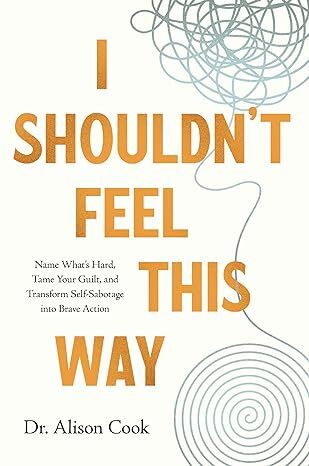
Dr. Alison Cook is a therapist and podcast host who specializes in combining faith and psychology. The excerpt she shares today is from her recently released book, I Shouldn’t Feel This Way: Name What’s Hard, Tame Your Guilt, and Transform Self-Sabotage into Brave Action.
Drawing from over twenty years of research and clinical practice, I Shouldn’t Feel This Way guides you through a groundbreaking 3-step process that has helped tens of thousands of people find emotional freedom and surprisingly simple breakthroughs. Dr. Alison shows you how to
identify guilt and know what to do with it,trade feeling stuck in your head for clarity,move from comfortable numbing to courageous conversations, andmake decisions that break cycles of defeat.Change starts when you finally stop beating yourself up for the way that you feel and say, You know what? I do feel this way! And I can read and prayerfully engage and finally do something about it.
{Our humble thanks to Thomas Nelson for their partnership in today’s devotional.}
May 3, 2024
What to do When You’re Stretched Thin & Spinning All the Plates
As a momma of 7, I know what it is like to be juggling all the plates and trying to hold on to each one so that nothing falls by the wayside. We have all gone through busy seasons of motherhood—the times when it seems like we can’t just stop and catch our breath because every moment is so hectic. Today’s good word is like a cup of cold water: The Lord is with us even as we are dashing from one activity to the next without a pause in sight. It’s a joy to welcome Becky and Susan to the farm’s table today…
Guest post by Becky Thompson and Susan K. Pitts
I closed the library book and placed it next to my seven-year-old Jaxton’s bed. I prayed for him and gave him one last big hug before I turned out the light and closed the door behind me.
I had enjoyed spending this time with him, but at the very same moment, I wondered whether I had spent enough time that day with my other two children.
I thought about how I hadn’t had a proper conversation with my husband in what felt like a week. I recalled all the work I needed to get done before I turned out my own light for the night.





Truthfully, I’m rarely the momma who reads her kids books before they go to sleep. With two in middle school, it’s not often that anyone even wants me to read them a bedtime story anymore.
This season is full of practices and ball games in the evenings. I dart from one moment to another, handling one crisis after another, dealing with one more unforeseen situation after another.
I love this life God has given me, but I’m forever juggling the plates—each representing something or someone I’ve been entrusted with.
I’m often so focused on not letting any of them fall that I sacrifice my own peace of mind. I sacrifice my own rest. I let my own heart break to bits with worry and guilt in order to protect each precious plate from peril.
“When you seek Him, He will provide all that you need to face whatever may come“
Do you relate?
In moments like these I need Jesus to speak directly to my heart. I long to hear Him speak gentle words of grace, like these: My love is enough. My hope is enough. My peace and My presence are enough. I keep the world spinning, and I hold everything in My hands. As you run from need to need, remember that you’re not God . . . I am. So ask Me for help because I’ll give it. Ask Me to intervene because I will. Allow My strength to move through you. That’s the only way juggling plates don’t fall.
Right now, it’s possible to lean into the truth that God will help you with each task in front of you:
When you seek Him, He will provide all that you need to face whatever may come: “Seek first the kingdom of God and His righteousness, and all these things will be added unto you. Therefore do not worry about tomorrow, for tomorrow will worry about itself” (Matthew 6:33-34, bsb).
Tomorrow as you move from need to need, person to person, task to task, ask God to help you with each one as it comes. Stay focused, not just on what is right in front of you but on who is with you as you get it all done.





Let’s pray . . .
Tonight we pray for us of us who are juggling all the plates. Lord, she takes care of so much.
Whether she’s focused on her children, her spouse, her job, or maybe her health or other issues, she keeps going every day, all day until she collapses into bed at night. Then she dreams of what she left unfinished as she waits for the juggling to begin again in the morning. There always seems to be more to do.
Tonight, Lord, we ask that You grant each woman peace and rest so she wakes strengthened to face tomorrow. Help her to be kind to herself. Help her see You helping her with what must be done. We ask in Jesus’s name, amen.
Father, remind me that You have a firm grip on me and all these plates.
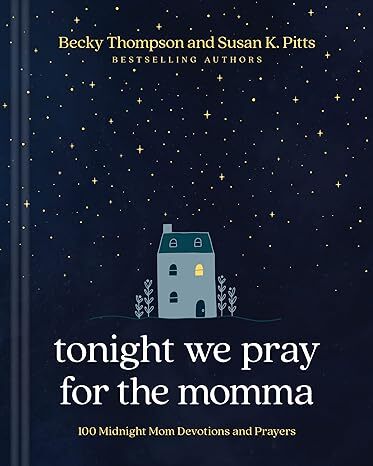
Discover hope for all of your midnight moments of motherhood.
In Tonight We Pray for the Momma, USA Today bestselling authors Becky Thompson and Susan K. Pitts offer one hundred devotions and prayers for the hard and heavy seasons of motherhood.
Susan K. Pitts is coauthor of the USA Today bestselling Midnight Mom Devotional. She serves alongside her daughter Becky as the codirector and prayer team leader of the Midnight Mom Devotional online community, a ministry dedicated to leading millions of moms in nightly prayer.
Becky Thompson is a USA Today bestselling author and the founder of the Midnight Mom Devotional online community, a ministry gathering millions of women in nightly prayer. Her ministry focuses on restoring peace to the anxious woman’s heart, inviting women into an encounter with God’s presence, and teaching women about the life-changing power of prayer. Through her books and dynamic online resources and courses, Becky connects women to the hope found in Jesus alone.
God is with you in the moments when the light feels dim and you need peace, and He will meet you in His love, sustain you in your journey, and bring you hope in the dark as you open the pages of Tonight We Pray for the Momma.
{Our humble thanls to Tyndale Momentum for their partnership in today’s devotional.}
May 2, 2024
How is Loss A gift? (About Grief, Gratitude, & the Gifts of God)
Three years to the hour that the police drove up the lane in the rain, I find myself unexpectedly reclining in a dentist chair, tasting blood in the back of my mouth.
Don’t ever belittle the huge hole your leaving will leave.
The dentist’s sliced a cut in my gum, opened me up, and I’m lying there, exposed to the bone. There isn’t one single day that I haven’t felt the gaping hole he’s left. I’ve lost count how many times I’d give an arm and a leg just to hear his voice one more time, just to ask him what to do and which way through.
It’s 1092 sunrises now without him, and it’s grief that lays you right bare, exposed straight down to the rawest parts of you, wild and untamed.
That’s what grief is: Grief’s savage, like a beast unleashed. Face the grim reaper, and what can the human heart do but soundlessly rage?
Grief’s weeping and gnashing of teeth is but proof of how deeply and wildly we have tasted of love.
 photo: Ruben Timman
photo: Ruben Timman 
 photo: Ruben Timman
photo: Ruben Timman From behind his surgical mask, the dentist muffle-asks his assistant to turn the playlist to something happy, lighter, but it doesn’t really make a wit of difference who’s crooning about love and buying themselves flowers, I can still feel this emanating deep ache, I’m still blinking it back.
There’s a God-shaped hole in the center of every human heart — and there’s a you-sized hole in the puzzle of the world that, in all of human history, God made for only you to fill.
You can try to muzzle grief with a smiling, civilized mask. But grief still lies in wait, crouched behind the most benign moments in time, ready to shred any unsuspecting, ordinary moment with a missing of what was and what will now never be.
Rain on a tin roof — and I miss him singing, “Listen the the rhythm of the failing rain…” Hold in hand an invitation to a baby shower– and he’s never going to get down on the floor and grin huge, pushing John Deere tractors across the floor with any of our grandkids. See a plate of baked beans — and I can see him buttering his bread and winking as he asked for seconds. Grief’s its own kind of endless exhaustion, as you try to keep the grief at bay, as you try to contain the untamed.
Right where I’ve lost my tooth, the third molar in quadrant 2, the dentist’s hovering over me, drilling a hole down into the jawbone. I close my eyes.
Don’t ever belittle the huge hole your leaving will leave.
There’s a God-shaped hole in the center of every human heart — and there’s a you-sized hole in the puzzle of the world that, in all of human history, God made for only you to fill.
And when you lose someone, there are parts of you that you can no longer find.
The dentist may at least have finished the drilling, but there’s this pain that no numbing or freezing in the world can touch and, lying there in the dentist’s chair, there’s this strange solace of feeling physical pain as this sharp, cathartic relief — a lancing, a manifesting — of this deep, interior emotional ache of a heart break.
The dentist stretches out his hand, asks his assistant to hand him the tiny titanium post.
I wince a bit, lace my hands together, bracing.
You were one of the hands of my interior compass, Dad, and the woods are dark and the shadows long and by God, it takes courage, and how are you not here with us for the whole way through? How are you really not ever coming back and how is there time and roads without the rare and uncommon gift of you?
I don’t know if our loss was some punishment, but I know it was Tolkien who said, “A divine ‘punishment’ is also a divine ‘gift’,” and I know it was Stephen Colbert who, through tears, paraphrased that to mean, “What punishments of God are not gifts?”. And I don’t know at all — actually, it’s a gut-wrenching, bewildering wrestle for me — how to count that a gift which I’ve wished countless times had never happened.
Gratitude for the gift of your story – means being grateful for all the pages of your story. Because to tear out some of the pages of your story – would tear up the story of you.
But this, after years of exhausting wrestle, is what I’ve come home to rest in: Gratitude for the gift of your story – means being grateful for all the pages of your story. Because to tear out some of the pages of your story – would tear up the story of you.
To get to love is a gift — and there is no loving without suffering. The only way to avoid all suffering — is to avoid all loving. To be deeply human – is to deeply love – which means to deeply suffer. Suffering and grief is on the way of everyone being truly human.
And ultimately:
What griefs in life are not gifts – if those griefs move you closer to comfort other grieving hearts — if those griefs move you closer to the comfort of God?
Grief is this deep emotion – that’s meant to put your heart in motion – to move you, move you toward embracing others in their grief, and move you toward the intimate embrace of God.
What griefs in life are not gifts – if those griefs move you closer to comfort other grieving hearts — if those griefs move you closer to the comfort of God?
And this tender journey of the last 3 years keeps proving how grief and gratitude are not opposites, but grief is gratitude for what was.
Grief and gratitude are not two different extremes, but rather two different expressions of the same emotion: love. Grief and Gratitude are joined sojourners, on the way of Love.
And if grief is love dying for a way to still express itself – then does grief find some healing when we find ways to keep expressing our love?
Does grief find some healing if we, when we’ve taken all the time we need, then let all the emotion of grief then put us in motion, moving with loving empathy out into a longing, needing world?
With the implant now drilled deep down into my jaw, the dentist explains how the steel post now needs months to merge with the bone. “So just avoid placing any stress on that whole area as it heals,” he nods, his eyes gentle and kind.
And I nod through the freezing, feeling the strings of the stitches there in my gum, and I’m trusting that time can’t heal all wounds like God does.

 photo: Ruben Timman
photo: Ruben Timman 
I wait now through more sunrises, more sunsets, and I never get over how he’s not here, really not here anywhere, how he’s really not coming back to me here, not ever, how his absence is this weight that I feel in my every day.
I wait as steel post merges to bone.
And that post on Calvary’s hill, with those steel nails driven right through, it merges and binds the heart of God to all the willing, wounded hearts and what heals is that God suffers with us too.
Shared tears is multiplied healing and God weeps with us too.
Life breaks our heart in two, and God breaks His heart and gives us His, and right here and now, He’s working to make us and all this hurting world new.
There’s another appointment on the calendar for the dentist to check on the healing.
And that’s you can taste, even now, with every tender moment — all this healing grace.
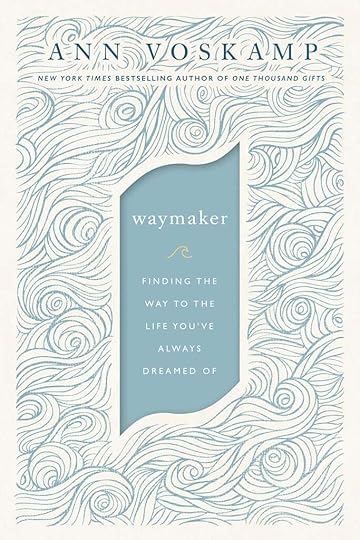
How do you actually practically find way to heal through loss — in the embrace and comfort of God?
What does it personally look like to turn toward God in the midst of loss — instead of turning away?
In the midst of heartache:
What does it powerfully look like to have a new way of life, a new way of being that rests fully in the hesed loving kind ways of God?
April 30, 2024
How Grounding Yourself in God’s Presence Reshapes Your Brain for Love
Have you ever felt towards God the same way you felt towards your parents? Maybe you’ve felt angry at God like you’ve felt angry at your father. Or betrayed by God the same way your close friend betrayed you. This is not a coincidence. Our early childhood connections with our caregivers shape the way we view the world and, often, the way we view God. Today, Summer reminds us that when we can’t remember God’s love in our day-to-day lives because of our past or the chaos of daily life, we need to provide ourselves with a visual reminder. Here’s the powerful reason why – when we are firmly rooted in God’s nearness in the ordinary moments, we can rest in God’s love in the midst of life’s storms. It’s a privilege to invite Summer onto the porch today.
Guest Post by Summer Joy Gross
The presence candle was lit on my kitchen island that morning.
Every once in a while, I looked up from the computer to watch the flame flicker, remembering in the midst of my everyday-ordinary, “God, You are here.”
The kids filled the dishwasher after last night’s burgers, but left a sink full of the big pans. This was my ordinary, semi-controlled chaos. It was not cleaned up perfect. It was not scrubbed. Yet, God was in it, even in the midst of my mess, and the flicker of the candle reminded me to look for Him.
While speeding through my day, I needed a still point, like the clock on the wall that dancers keep returning to as they accomplish their turns. A visual anchor. This candle called me back, reminding me of the truth: I am never outside the warmth of God’s love.







And here’s the brain science around this practice of keeping a lit candle in a common space: by using a constant reminder of God’s presence, we’re laying the groundwork for spiritual object constancy. Object constancy is the concept of believing that an object still has reality even when it’s out of sight.
Our brains have been wired to scarcity, to absence, to loss. Sometimes our brains, through loss, have been wired to believe we will be abandoned.
Our brains need to be rewired for perfect Love. And lavish love is a new landscape we need God’s Light to find.
“Trust is built one marked experience of care after another... It takes time to establish that love is not scarce.“
At ten years old, Sofia refused to sleep when she was brought home to the States from the African orphanage. Every night was a battle. As soon as her mother walked out the door, Sofia panicked. If Sofia happened to fall asleep from exhaustion while her mom was still in the room, she would wake up multiple times throughout the night screaming for her mom’s presence. For Sofia, abandonment was not a future fear but a reality she had already experienced.
Trust is built one marked experience of care after another. Sofia, of course, hadn’t reached emotional object constancy. It takes time to establish that love is not scarce. Again, emotional object constancy means a child believes love is still present even when their caregiver has walked out of the room.
Have you ever played hide and seek with a toddler and watched them crawl out of the room looking for you while you were still sitting on the couch, a large mound covered with a blanket? When you pulled that blanket over your head, the little one no longer believed you were present. They have not yet achieved object permanence.
It takes thousands of interactions of faithful loving care for a child to achieve emotional object constancy.
Each time a caregiver responds consistently to a cry, each soothing voice, each nighttime rocking, each cry of delight gets stored in the brain and builds a neural pathway that creates a sense of security.
It’s transferred through the senses. We feel arms wrapped around us. We see the tender gaze of love. We hear the soothing voice of the caregiver. We taste milk. Over time, the love of the caregiver is stored up within the child, and the child is given a sense that they are living in a safe and secure world. Their brains are wired to believe love is consistent and care is plentiful.
“Love was a visual anchor when she was experiencing fear’s raging storm.“
Exhausted, Sofia’s mom called her adoption services representative. She suggested that Diana prove that she was still thinking about her daughter throughout the night and show her daughter that she was safe. So Diana strung a wire above Sofia’s bed and throughout the evening and occasionally at night, she would sneak into the room and clip a small, pink construction paper heart onto the wire. If Sofia woke up, she could visually see that she had not been abandoned, that her mom was thinking loving thoughts toward her during their separation.
Love was a visual anchor when she was experiencing fear’s raging storm.
After a few weeks of pinning hearts, Sofia was able to sleep through the night peacefully. Sofia’s trust grew one pink construction paper heart at a time.




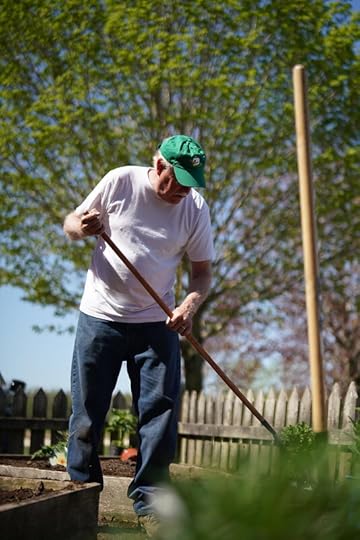
Throughout history, God provided object constancy through visuals of His presence.
As He provided a way out of slavery, the presence of God led the Israelites through the desert via a pillar of cloud by day and fire by night. As they looked toward the tabernacle, they saw the glow of presence. As they collected manna on the ground and stood up, straightening their backs, they held provision. They tasted provision.
“A secure attachment is built first on the foundation of our Emmanuel’s presence. Sensory reminders of His presence can anchor us through life’s storms.“
The Lord knew the people of Israel would need a constant reminder of His nearness in order to begin to build attachment. A secure attachment is built first on the foundation of our Emmanuel’s presence. Sensory reminders of His presence can anchor us through life’s storms.
These days I live in the suburban sprawl around the city of Atlanta. I light the presence candle on my kitchen island and it surprises me awake.
“You are here,” I whisper as I touch the flame of the match to the wick.
And sometimes , that’s it. Nothing more. Just assent. I need a visual reminder that no matter where my attention strays, God’s Emmanuel promise stays the same.
Other times the flicker awakens need, repentance, a heart turned back toward His heart after I’ve eaten at a table set by scarcity.
When we’re in a slumber of inattentiveness, we believe the lie of abandonment. We believe we’re alone, pickaxing for provision, mining for love. We miss the truth that the God who made the universe is actively pursuing our hearts, carrying the cross on his shoulders along the Via Dolorosa, the Way of Love. He was dying for desire for us.
Our Emmanuel has been fighting our separation from day one.
He has been pursuing YOUR presence from day one.
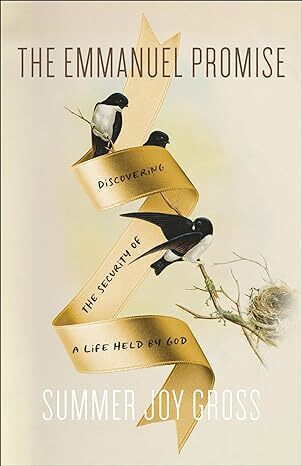
Summer Joy Gross (MDiv, Virginia Theological Seminary) is an Anglican priest, retreat leader, and spiritual director whose work is guided by the belief that our stories can be transformed by God’s invitation to make His love our home base. She is associate faculty of spiritual formation and the art of spiritual direction at the Healing Care Ministries’ spiritual direction school. She is the host of The Presence Podcast and lives in North Georgia with her husband, their three teenagers, and their Brittany Spaniel, who points lawn ornament rabbits around their suburban neighborhood. Connect with her online at AThirstForGod.com and on Instagram @RevSummerJoy.
In The Emmanuel Promise, Summer helps us to explore the attachment stories which may be impacting your relationship with God and also gives us simple repeatable tools to help us build a secure attachment. Drawing from the deep well of Scripture, attachment theory, and her own personal story, she invites you to experience Emmanuel, God-with-us, as the One whose love toward you is secure and unchanging.
{Our humble thanks to Baker Books for their partnership in today’s devotional.}
April 26, 2024
If You’re A Mom or Love One- You’ve Got to Read This
Savannah Guthrie shares deeply personal stories in her new book, Mostly What God Does. It is an honest exploration of the love of God and a biblically rooted look at six essentials of faith; love, presence, grace, hope, gratitude, and purpose. Here, Savannah shares more on love, what parenthood has taught her and God’s ultimate real-life metaphor.
Guest Post by Savannah Guthrie
I will never forget laying eyes on Vale for the very first time.
I can still see the doctor lifting up her little frame high in the air to give me the first glimpse. “It’s a girl!” he exclaimed. “She’s a chunker!”
She was eight pounds, nine ounces of sheer miracle.
I felt a combination of ecstasy and shock—how could it be that what was nothing nine months before had turned into such a profound something?
I cradled her face to mine. Cheek to cheek, my girl and I. The tears tumbled out, a dam-like release from a place deep within, as though lying dormant until precisely this moment. I knew these strange and lovely tears were always, only, meant just for her.
Two years later, weeks shy of my forty-fifth birthday, my little firecracker Charley wailed his way into the world. Our family was complete.







My kids are simultaneously my greatest joy and my most searing daily challenge. Loving them has made my life meaningful.
Because I came to parenthood later in life, long after I had given up hope, I do not take it for granted. When Charley was six weeks old, I brought both kids home to Tucson to visit my mom. My cousin Teri, who was like an aunt to me growing up, drove down from Phoenix to see us. “Oh, Savannah,” she said, her eyes glistening as she watched me with my babies. “It’s all you ever really wanted.”
“Motherhood. What a revelation. Physically. Emotionally. Intellectually. And yes, spiritually. I can think of no other experience that has more enhanced my understanding of God. “
Motherhood. What a revelation. Physically. Emotionally. Intellectually. And yes, spiritually. I can think of no other experience that has more enhanced my understanding of God.
To me, parenthood is God’s ultimate real-life metaphor; it is the closest humans will ever get to grasping how God relates to us. It is no accident the scriptures refer to him as our heavenly Father, and we, his children—the nearest approximation of God’s love for us is parent to child.
In my experience, God’s revelations are always much more about “show and tell” than scrolls and edicts from the mountaintop (except for Moses that one time). Being a mom has been quite the show and tell for me, bringing home, in the most profound and personal way imaginable, what God must be thinking and feeling at any given moment.
It’s worth taking a moment just to ponder it. How we feel about our kids is how God feels about us. The way we adore them. The way they make our hearts leap with joy. The way we revel in their personalities and gifts and quirks. The way we glory at their milestones and accomplishments, no matter how minor. Watching them grow is like witnessing the unfolding of a flower in real-time, a gift we get to open and reopen every day.
God’s connection to his children is stunningly intimate and tender—like a mother to her child. I don’t know about you, but I can scarcely take that in. It is overwhelming to imagine that God could feel that way about me. Too good to be true. But transformative if truly absorbed.
God’s great metaphor does not end there. Every parent knows that to have children is to carry a joyous burden of worry and fear and concern. The famous quote is famous for a reason: “To have a child is momentous. It is to decide to have your heart go walking around outside your body.”
When my cousin Holly had her first baby, I asked her what it was like. She said, “It’s like having a thorn. You love that thorn, but it is a thorn.”
Our kids worry us. Challenge us. And they frustrate us, some- times to our breaking point, especially when we are just trying to ward off disaster, only looking after their best interests. From explaining to a toddler why they can’t have ice cream for breakfast, to telling a tween why she isn’t allowed on social media, it is often an exercise in exasperation and helplessness.
If only I could make them do what is good for them! How I wish I could just make them understand that the things I’m doing or forbidding—it’s for their own good! It is not to be cruel or with- hold happiness from them. I’m on their side!
Now imagine those words from God. About us. And we are beginning to grasp his perspective toward his children.
“To me, parenthood is God’s ultimate real-life metaphor; it is the closest humans will ever get to grasping how God relates to us.“
We are imperfect humans who stumble and fail. We make bad decisions. Things go wrong and we don’t understand what God is doing. We complain and rebel. We withdraw, sulk, and give God the silent treatment.
We can’t see the big picture. Like kids who are incapable of seeing the long view (“One day you’ll thank me I didn’t let you get a face tattoo!”), we don’t have a wide enough perspective. We are only human. We don’t have the multidimensional vantage point of God, taking account of people, places, and events, of future and current and past.
But like a good parent, God does not let this get to him. He does not grow impatient. He does not rage. His love, compassion, and unwavering commitment never fail—regardless of how we act, what we say, or what we “deserve.” And his forgiveness is always available when inevitably, we fall. When we turn to him, we find him waiting with outstretched arms.






My son, Charley, had a protracted “mean to mommy” phase when he was four. Like so many toddler phases, it lasted much longer than I could tolerate.
“How was your playdate today, sweetie?” I remember asking him once. “I had such a good time. I forgot about you,” he replied. “And I wanted to forget about you.” (Yes, I wrote down the exact quote.) I worried I was raising a little boy who hated me. I even called the pediatrician who laughed and said, “Oh, they’re meanest to the ones they feel the closest to!”
“God’s feelings for us have nothing to do with our feelings toward him… He loves us not because of who we are or what we do, but because of who he is and what he does. “
Toddlers are like little scientists, watching everything and gathering data: What happens if I throw this? What happens if I press there?
In this case, the “there” he was pressing on firmly was my heart. Intellectually, I could understand that he was just testing, taking his personality out for a spin. I attempted to keep a stoic face in front of him, maintaining a cool exterior—then, I would close the door and cry actual tears because a little boy hurt my feelings.
Let’s face it: kids often are their worst at home. They walk in, kick off their shoes, dump out their backpacks all over the floor and their emotional baggage all over Mom.
But here’s the thing that parenthood has taught me— something unique to any other kind of relationship. It does not matter how our kids act; our love for them is unshakable.
So it is with God.
This is the bedrock truth that motherhood has brought home to me in the most visceral way. God’s feelings for us have nothing to do with our feelings toward him. His thoughts toward us have nothing to do with our thoughts toward him. We cannot do or say anything to make him love us more—or less. He loves us not because of who we are or what we do, but because of who he is and what he does.
He loves. Like a mother. But better.
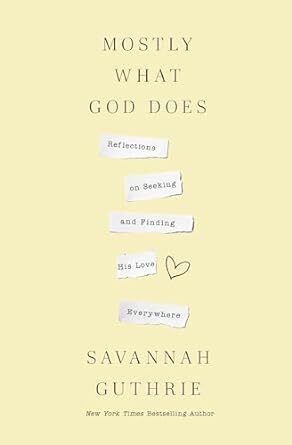
Savannah Guthrie is an Emmy and Edward R. Murrow Award recipient and best known as co-anchor of NBC’s TODAY show. Her first trade book, Mostly What God Does, is available now. She’s penned these reflections to help you engage in the real and practical ways that God loves you. With true stories that bring both tears and laughter, you will discover a path of faith that is both authentic and heartening.
{Our humble thanks to Thomas Nelson for their partnership in today’s devorional.}
April 24, 2024
Do This: When You’re at the End of Your Rope and Have Kinda Reached Your Limit
You know life at your limits.
You, with your promising calendar and brave to-do lists and begging prayer journal, you with your dog-earred how-to books and your determined jaw and scuffed up knees and weary shoulders, you know exactly what it’s like to live at the edge of hope, at the very brink of dreams, at the cliff of prayers and gaze out with longing for all that is beyond.
You know what is like to come to the end of yourself, the end of earth as you know it, and stand there on the last inch of land, and witness the surrendered way of waves, and long to go deeper, long to go all the way straight through.
Straight through with the straight-up impossible with this one child, straight through the storm of one exhausting, tumultuous relationship, straight through and out of what you’d do just about about anything to find any exodus out of.
The surging surf of your life keeps slapping at your feet, waking you to ways way beyond your depth.
 Painting: Looking Far, Hyatt Moore
Painting: Looking Far, Hyatt Moore



 Painting: WayMaker, Kristi Hall
Painting: WayMaker, Kristi Hall

And there’s a story you have to know that the Jewish Midrash tells.
That there was a guy named Nahshon ben Aminadab, who was a slave among a people of slaves bound to hopelessness in Egypt, and, Scripture tells us how Nahshon’s sister, Elisheba, actually married Aaron — making Nahshon’s the brother-in-law of Aaron (Exodus 6:23).
You have to know how Nahshon had escaped Egypt with his people one bloody night, with next to nothing in hand, but gripping to God for all he was worth, only to turn and see the red dust clouds of Pharaoh’s chariots storming across the desert floor — and the expanse of on endless cerulean sea crashing right there at his feet.
Some scholars said that Nahshon and the Israelites may have outnumbered the Egyptians 10,000 to 1. But fear is the con artist that stretches things, the clever magician that always dupes and the Israelites see the approaching hundreds of Egyptians as an entire horizon erupting into a monstrous horror.
Nahshon could feel it under him, the ground quaking with the rumble of the coming Egyptian chariots. And yet, Nahshon’s heart pounded braver and you know it too:
Your knees can quake, but never your faith.
The Jewish Midrash says that Nahshon, his heart steady, surrendered, deeply stilled in God, trusting — he rejected the notion of drowning in fear, he rejected the inaction of outrage, he rejected the paralysis or bitterness of feeling abandoned — and he not only believed it, he chose to be living it:
“The only way forward is to step into your sea — because you’ll drown in despair if you don’t follow Hope Himself forward.“
Put one foot in front of the other — and walk toward the impossible water. Drench yourself in Hope.
You know it on your best days: Only Forward. Only faith. Only fervent hope that refuses to shrink back.
The only way forward is to step into your sea — because you’ll drown in despair if you don’t follow Hope Himself forward.
You have to know that the Midrash says that the man Nahshon, brother-in-law of Aaron, walks straight into slamming waves up to his waist.
You only find a way through waves — when your faith isn’t as fickle as waves.
It’s only a leap of faith when you feel how the water’s deep.
The Midrash says cold water rises up the Nahshon’s neck.
You can feel it too, as you take the next step forward into the impossible: Steady, steady.
Comfort your doubts with courage in Christ.
The Midrash says waves lapped up to Nahshon’s chin.
It’s true and you’ve known it on your hardest days:
Waves rise up over lips sealed with a kiss of unwavering hope.
“when you’re hope-formed, you see that your fears are formless, and void, and the Spirit of God hovers over your soul with a hope that makes you brave.“
But you know: Surrender. Trust. Abandon yourself to the One who never abandons. Be hope-formed, not fear-formed.
And when you’re hope-formed, you see that your fears are formless, and void, and the Spirit of God hovers over your soul with a hope that makes you brave. And that makes you walk toward waves.
“And the LORD said to Moses, “Why do you cry out to me? Speak to the Israelites, that they journey onward.” (Exodus 14:15)
Nahshon heard this, and we know this, in the face of our impossibles:
Journey onward. Get moving. Forward.
Ankle deep….. waist deep…. neck deep….. chin deep — nostril deep.
Deep calls to deep. Deep faith calls to deep waters.
Deep faith means being you’re deeper than neck deep.
“When you are out of your depths — you touch the depths of God.”
Deep faith for the bruised relationship, deep faith for the aching grief, deep faith for impossible change of diagnosis, deep faith for the child lost, deep faith for the dream that seems just beyond reach.
Drown all panic in Trust.
When you are out of your depths — you touch the depths of God.


 Painting: WayMaker, Kristi Hall
Painting: WayMaker, Kristi Hall





 Painting: Looking Far, Hyatt Moore
Painting: Looking Far, Hyatt Moore“God often waits till the end of the eleventh hour — to fill all our hours with trust.”
You just have to know when you are overwhelmed and about drowning in what seems impossible:
God often waits till the end of the eleventh hour — to fill all our hours with trust.
God asks for faith to the last second — so He has first place in our hearts.
And yet — what if God doesn’t?
Even if God doesn’t — we will not even waver.
Unwavering faith splits the waves to make a way into the arms of God.
“Unwavering faith splits the waves to make a way into the arms of God.”
Sometimes God lets the waves rise — to drown all our other wants.
Sometimes: God holds back so we grow stronger in holding back our fears — and so there can be no holding back on giving Him all the glory.
Sometimes: God holds back until the last possible second — so we hold on to Him until the end of time.
Who hasn’t known the Eleventh Hour God?
Hadn’t Sarah laughed at the possibility of a child long after it seems her biological clock has struck the last minute — because sometimes we find laughter’s a shield when we’ve lost hope.
But there’s a time for Sarah-certainty, to “[believe] the One who made a promise would do what He said” (Heb. 11:11).
Job kept waiting for things to turn around — yet catastrophe after catastrophe, things kept turning for the worse. But there is a time for defiant Job-faith that drives a spear through despair and the doubt: “Though He slay me, yet I will trust Him” (Job 13:15).
Abraham’s faith is stretched to the nth degree on Mount Moriah, holding a knife in his hand over the incomprehensible sacrifice — but yet — there’s a time to be holding on tighter to Abraham-hope that there has to be another way.
You have to know this: We only find a ram in the thicket at the last possible second. And the ram God gives may not be any ram you ever imagined.
Nahshon waited on God up to his nostrils. He kept moving toward God with all his heart.
And you just have to know: “If you make a run for God—you won’t regret it!” (Ps. 2 MSG).
And at the moment’s Nahshon is about aspirate in the Red Sea right there at his nostrils — the sound of his every breath, sounding out the name of God, YWHW, YHWH, YWHW, his very life-breath calling out the name of his Maker — and God, set to get to His own whom He had first leaned in and kissed to life with His warm breath — God, in a tempest of love, with a blast of His nostrils, tears the sea in two to make a way out of bondage to fears for His own and into bonding.
As the waters fill Nahshon’s nostrils — a blast from the nostrils of God piles up the waters of the Red Sea.
The man breathed trust — and the water split into a road of dust.
When breath becomes prayer, God comes.
“Only God can divide seas. And it is only ours to have an undivided heart.“
“… and the LORD held back the sea with a mighty east wind all night, and He made the sea dry ground, and the waters were split apart.
And the Israelites came into the sea on dry land, the waters a wall to them on their right and on their left. “ (Exodus 14:21-22)
Only God can divide seas. And it is only ours to have an undivided heart.
And you have to know, what’s right there, in how Nahshon waited on God, and yet kept moving toward God:
“even when everything is falling apart, you are always walking a Red Sea Road through parted waters if you are walking closer to Him.”
Joy isn’t a place on a map, it’s a movement in the soul toward the person of God.
Joy is always, simply, an inner movement toward meeting more of God. God is the goal. Home is Him. The Promised Land isn’t a place — but a Person.
And even when everything is falling apart, you are always walking a Red Sea Road through parted waters if you are walking closer to Him.
Every exodus out — is only to enter in.
Every exodus out of bondage — is for bonding.
Every exodus isn’t for an escape out of a situation — but for attachment to a saving Savior.


 Painting: Looking Far, Hyatt Moore
Painting: Looking Far, Hyatt Moore


 Painting: WayMaker, Kristi Hall
Painting: WayMaker, Kristi Hall

And you have to know that while Scripture doesn’t tell us this story that is found in the Midrash of of Nahshon who willingly stepped first into waves of the Red Sea, faith up to his eyeballs — what Scripture does definitely tell us of Nahshon is that he has a son too. A prince.
The Prince of Judah.
Nahshon, who was the father-in-law of Rahab, was the grandfather of Boaz, and was the great, great, great Grandfather of King David. And if you linger in the opening lines of the New Testament, there you read: “This is the genealogy of Jesus, the Messiah, the son of David: …. Amminadab the father of Nahshon, Nahshon the father of Salmon.” (Matthew 1:4-5)
There is a Son who splits the seas and makes a way and is the Way and He is worthy of a whole ocean of faith.
He is worthy of trusting enough to take the next step. To keep walking forward. To walk with faith right up to your eyeballs.
Oh, you know life at your limits.
“Where we run out, the promises of God run on, and will carry us on.“
And you can stand at the very edge of the shore, at your very edge, the very limit of your hope, and you can look out at your impossible and you can boldly take your Nahshon step into the waters and know:
There is a Red Sea Road through whenever we see how He loves us — and is making a road through our waves to us, to be with us.
Where we run out, the promises of God run on, and will carry us on.
And straight on through into greater depths of His love.

How do you actually practically find way to to live that is receptive to the love of God — so that you can actually persevere?
What does it personally look like to form your mind, your days, your life, into the deeply meaningful, cruciform love of Jesus and let God love you in the ways He deems good and best?
What does it powerfully look like to have a new way of life, a new way of being that rests fully in the hesod loving kind ways of God?
April 19, 2024
If You Want the Practical Password to Joy – to Slay The Dark – & have the Best Eulogy, Read This:
I’m standing in the kitchen this week when I whisper to the Farmer:
“We need a password.”
He raises his eyebrows, and I look for the answer to the question his eyes are asking:
“It’s just — when we’re caught up in some circling vortex of dark, I think we need a password to cue us to cut the mental Gordian knot. Some gentle password that’s our cue to mentally shift gears – to just cut through the dark.”
“Your soul is a compass and you get to choose the direction you’re get to go.“
It’s right and good to hold space to fully grieve a season, so we can fully leave the dark of a season and enter into more good. But rumination doesn’t hold space for grief, but rather keeps circling the dark and swirling round and round, till the dark takes and locks your soul in a chokehold. You know you’re ruminating when you’re dwelling on the problems instead of in God.
Rumination relentlessly circles the drain of despair and isn’t your only life and your joy worth more than that and doesn’t your soul need to come up for air?
And there at my wrist, I trace the only word inked anywhere into my skin:
Eucharisteo. The Greek word for giving thanks, when Jesus took the bread, and gave thanks, eucharisteo, at the Last Supper.
There’s a password that’s a passageway out of the dark.
Because sometimes it’s a Greek word that helps make sense of a knot of all the dark that reads as pretty much Greek to you.



 Favorite: Eurcharisteo Mug
Favorite: Eurcharisteo Mug“I think that’s it: Eucharisteo. That’s the password we say out loud when we’re caught up in any cycle of ruminating, when we’re caught in a vortex of dark, when that dark could knot us all up. Say the word – eurcharisteo – and that’s our cue. Our cue to name our thanks for all the graces here and now.”
“We all need a cue to turn and choose gratitude. “
That’s the password: Eucharisteo – give thanks. That one word that offers a three direly needed keys:
Charis… Grace – see all as grace…
Eucharisteo… Thanksgiving – then give thanks for the all that is grace…
Chara… Joy! Then, grace upon grace: joy is always, always, somehow, really possible…
There, that, in a word, is the password that unlocks the kingdom of God: Eucharisteo.
“Eucharisteo:
There’s a password that’s a passageway out of the dark.“
We all need a cue to turn and choose gratitude.
Slay ruminating with daily thanking.
It’s true: All those living wholeheartedly hold space in the four chambers of their one heart for gratitude and for grief — for lamenting life, and for loving life.
But: If you ruminate on the dark, and only solely let the lamenting and grieving chambers of your heart pulse, you end up in heart failure.
And if you invalidate the dark, and only blithely let the chambers of gratitude and loving be your life pulse, you end up with one erratic, weak heart beat.
Eucharisteo is the password for fullest, realest life – because giving thanks gives the chokehold of the dark the ultimate slip.
And lets you breathe grace, and your heart beat fully free.


 Favorite: Eurcharisteo Mug
Favorite: Eurcharisteo Mug
 Favorite: Eucharisteo Mug
Favorite: Eucharisteo MugI’m walking out of a church on the edge of a woods on the first warm Sunday this spring, when one of our sons messages me and I stop to read the words slowly on the screen, and I read them more than once:
“To practice gratitude is to learn now, what you will do forever. ”
“I find it interesting, that in the face of real trauma, instead of holding on to bitterness, or refusing to forgive, you’ve chosen gratitude and trying to live open-handed. Choosing gratitude versus choosing anger or getting swallowed up by the dark …. leads to very different places.”
It’s always true: Your soul is a compass and you get to choose the direction you’re get to go.
Our daughter studying for her first year university exams had mentioned it to me earlier just that same week, how she was studying in class what it means to live a life for a eulogy and not for a resume.
And that’s what I think when I read our son’s message again – This is my eulogy:
Out of a life of choices, she chose gratitude.
She could have allowed discouragement, but she reached for courage, for a life fuller than that.
And bitterness could have easily seeped in a thousand subtle ways, but she chose to steep in His oceanic love and ride all the waves with grace.
Because she knew: The people who choose to give thanks, still give space for grief, but don’t give themselves over to any spiralling dark.
That is what she daily decided: Lament your losses, but don’t lose your life to lament; lose yourself in the sure love of God.
And she felt the utter relief of it: The people who choose to give thanks – are the people who choose to forgive.
“The people who choose to give thanks – are the people who choose to forgive. When you’ve given thanks for grace upon grace —- how can you not pass on all that grace? “
Because it’s true: When you’ve given thanks for grace upon grace —- how can you not pass on all that grace?
It might be the wide easy way, to take offence, but why let that define you when you could take joy?
And there’s always the option of pervasive hopelessness on one hand, or provoked harshness on the other, but there’s always the possibility to take God’s hand in everything and let all His grace enlarge your heart.
This is always the question: Why not gratitude some more of the misery out of your one life?
And if you can’t somehow find something to be grateful for — change just one thing, so somehow you can.
Go slower, linger longer. Still and breathe deeply. Look for the contours of beauty. Open wide your heart, your eyes, your hands, and receive. There’s good and grace and God, even here.
“What you focus on, is what you’re formed into. Be consumed by the darkness, and the darkness can consume you.“
To practice gratitude is to learn now, what you will do forever.
To practice gratitude is to practice the song we will sing for all eternity. What we choose to tune into every day, either tunes our hearts to sing His graces, or to murmur our disdain. Heaven and hell are not far off realities, but surrounds us here and now.
What you focus on, is what you’re formed into. Be consumed by the darkness, and the darkness can consume you.
Which is what Jesus meant when He said: “For all who take the sword, will perish by the sword” (Matt. 26:52). For all who take up bitterness, will perish by the bitterness; for all who take up cynicism, will perish by the cynicism; for all who take up sharpness and harshness, will perish by sharpness and harshness.
Or, to put it another way: “Beware that, when fighting monsters, you yourself do not become a monster… for when you gaze long into the abyss, the abyss gazes also into you.” (Nietzsche)
“You’ve been given only one life – live in ways you can give thanks for it.“
But God is a fountain of love, and His true disciples drink deep of His love, to be a fountain of love. The real people of God are a fountain of grace, a fountain of gratitude, a fountain of goodness of one great God.
Gratefulness is what greatly expands your life to hold more joy. What do you really want to hold on to – bitterness or more joy?
You’ve been given only one life – live in ways you can give thanks for it.


 Favorite: Eucharisteo Mug
Favorite: Eucharisteo Mug 

And out of a life of choices, she chose gratitude.
I’m sitting under a ring of lamplight last night, just before I turn the last light out, with the Psalms open there before me on that old table of ours made of barn beams, when the word of God reverberates off the walls of the four chambers of this ole heart, and this is what it feels like to be supported and upheld:
“Enter with the password: “Thank you!”
Make yourselves at home, talking praise.
For God is sheer beauty,
all-generous in love,
loyal always and ever.”
Thanksgiving in the heart opens the door into the presence of God.
And I smile grateful into all the darkening shadows:
The universe has a password and God chose the key to enter into His presence: Thank You.
Thanksgiving in the heart opens the door into the presence of God.
It’s thanks talk, not any trash talk, that will make you at home with the beauty of God, so you can dwell in joy.
It’s all one’s own miraculous choice…
And there’s one word, a password, worthy of one’s eulogy: Eucharisteo.
And out of a life of choices, she chose gratitude.
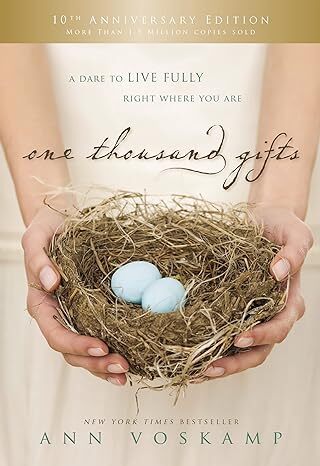
How do we find joy in the midst of the life you already have?
What if there was a way of seeing that opens your eyes to ordinary amazing grace,a way of living that is fully alive,and a way of becoming present to God that brings you deep and lasting joy?What if joy is always, always, always possible, right where you are?
Dare you to live fully. Dare you to joy!
Want the best eulogy? And learn not just the password into the fullest life, but into the presence of God, and practice what we will be doing for all eternity? Start here.
April 15, 2024
You struggling with perfectionism in your relationship with God? Read This
We know we won’t be perfect in this lifetime… For those who struggle with perfectionism in their relationship with God, Faith Chang has words of rest and relief born of her own wrestling with the desire to be holy. Today, she addresses, in particular, the sense that because of our imperfections, God at best just tolerates us. May you feel God’s welcome as you join us at the farm table today...
Guest Post by Faith Chang
As I write, an art print—housed in a double-glass, golden frame—rests on my desk.
At the center of the piece is a small illustration, drawn in black ink. A path winds through farmland toward a 1st-century Palestinian home in the distance. From this home on a hill, a set of stairs runs down to meet the path. At the bottom of the stairs, a shadowed figure is poised mid-stride.
The drawing is outlined in black, but there are touches of color too. Metallic blue, green, and golden paints highlight parts of the farm and spill into the piece’s wide, empty borders. A patch of silvery blue alludes to sky.
It is the painted path that draws the eye and gives the piece its name: Prodigal Streams.
At the edge of the field, the gold turns into a river of gleaming blue. This path-turned-river pours out from the scene and flows toward the viewer.
Toward me, writing at my desk—the prodigal welcomed home.





GOOD WITH GOD?
If, like me, you struggle with perfectionism in your relationship with God, you may find yourself carrying the sense that things with God aren’t good.
As “Christian perfectionists,” we may frequently fight the thought, “Something is wrong with me,” at a gut level, it also feels like something is not quite right between us and God. I say “at a gut level” because we can believe God loves us, and still feel in the day-to-day that He is unhappy with us.
Sometimes, as God sanctifies us, we begin to imagine that while he has much He wants to do in or even through us, he must not want very much to do with us—especially as we keep failing and falling.
“Sometimes, as God sanctifies us, we begin to imagine that while he has much he wants to do in or even through us, he must not want very much to do with us—especially as we keep failing and falling.“
Beneath our service to God and our efforts to obey him, we perceive some sort of relational tension. But through the stories of Scripture (and you might say the story of Scripture), God persistently shows us something different.
WELCOMED AND WANTED
We all carry stories that shape our conception of God. For better and for worse, our life experiences shape our understanding of words like “love,” “Father,” and “forgiveness.” The power of Scripture’s narratives is that through them, God gives us new stories to form our imaginations. The parable of the prodigal son is one such story (Luke 15:11-32).
Here’s a refresher on Jesus’ parable. A son asks his dad for his share of his inheritance, leaves home, and spends all he has on reckless living. Then famine hits. Destitute, he decides he’d rather be a servant in his dad’s home than starve alone, so he resolves to return, rehearsing an apology on the way back: “Father, I have sinned against heaven and before you. I am no longer worthy to be called your son. Treat me as one of your hired servants” (v 18-19).
The prodigal was right to risk his return, though even he couldn’t have imagined the welcome awaiting him.
“The prodigal’s lostness draws out the depth of his father’s affection all the more in his compassion and yearning.“
It’s this welcome that has been depicted so widely in art, most famously in Rembrandt’s masterpiece. The Return of the Prodigal Son and in countless other pieces like the one on my desk. It is the embrace of the father, who sees his son while he is a long way off and, abandoning all dignity, runs to him and takes him into his arms mid-apology. The prodigal is received not as a servant but as a beloved child.
The scene captures our collective imaginations because it’s the turn in the story that makes us catch our breath. We might say that the best the lost son could wish for was “mere toleration”1: something between a rejection and a return to how things used to be.
Instead, he finds his father’s love has not waned during his time away. Rather, the opposite seems to have happened. The prodigal’s lostness draws out the depth of his father’s affection all the more in his compassion and yearning.







THE SURPRISING WELCOME OF GOD
Those of us who are praying for prodigals know this yearning of love: the aching desire in our chest that they would come to their senses, no matter how far they’ve run. The 19th-century minister Horatius Bonar describes the way the father’s heart goes out to the prodigal, and how it reflects the compassion of God:
God’s hatred of the sin is not hatred of the sinner. Nay, the greatness of his sin seems rather to deepen than to lessen the divine compassion … The farther the prodigal goes into the far country, the more do the yearnings of the father’s heart go out after him in unfeigned compassion for the wretched wanderer, in his famine, and nakedness, and degradation, and hopeless grief. 2
Scripture is full of examples of this surprising welcome of God—his invitation for sinners to draw near and His earnest embrace of them when they do.
Come, let us reason together. Your sins may be as crimson, but you will be made clean (Isaiah 1:18).
“…in your weakness and sin, your Father’s heart goes out to you and He says, Come.“
Come, if you thirst, come to the waters. Come, buy and eat— even if you have no money to give! Come, taste wine and milk without price (55:1).
Draw near with your conscience sprinkled clean by the blood of Christ (Hebrews 10:22).
Draw near to the throne of grace boldly. Find mercy and grace to meet your need (4:16).
Come, all who are weary and heavy laden. Receive rest (Matthew 11:28).
This is the welcome of God for you. Your imperfections have not consigned you to a life of being merely tolerated. Rather, in your weakness and sin, your Father’s heart goes out to you and he says, Come. He isn’t just seeking a change in your behavior. He isn’t even seeking your usefulness to him.
Remember that it was not extra hands for the farm that the father longed for while the prodigal was in a distant country.
He wanted his son.
So it is with your Father.
In calling you to draw near, God seeks, and has always sought, you.
Kelly Kapic, You’re Only Human (Brazos Press: 2022), p 23.Horatius Bonar, God’s Way of Peace (Christian Focus, 2021), p 137.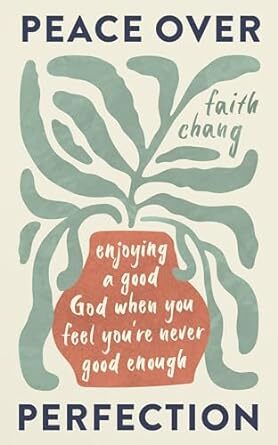
Faith Chang (B.S. Human Development, Cornell University; Certificate in Christian Studies, Westminster Theological Seminary) serves at Grace Christian Church of Staten Island, where her husband is a pastor. She is an editorial board member of the SOLA Network and co-hosts the Westminster Kids Digest Podcast at WTS Books.
In her new book, Peace over Perfection, Faith addresses the struggles of her fellow “Christian perfectionists” through meditations on God’s character. With nuance and care, she writes for those who seek to grow in Christ and live for God’s glory yet live in fear of failure. She explores the Bible to show that as God deals with us as in-process people, He is far more merciful, righteous, and patient than we may have imagined.
{Our humble thanks to The Good Book Company for their partnership in today’s devotional.}
Ann Voskamp's Blog
- Ann Voskamp's profile
- 1368 followers



